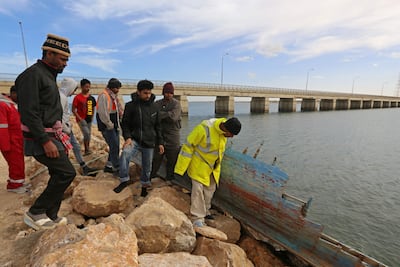Giorgia Meloni, Italy's Prime Minister, arrived in Tunisia on Tuesday for a state visit, which she previously expressed hope would help unblock a potential $1.9 billion loan from the International Monetary Fund.
Tunisian President Kais Saied warmly welcomed Ms Meloni to the Carthage Presidential Palace.
“You are a woman that says out loud what others think about in silence,” Mr Saied told Ms Meloni before gathered journalists.
Ms Meloni was received at Tunis-Carthage International Airport by her Tunisian counterpart Najla Bouden before her meeting with the President.
Before departing, the Italian Prime Minister told journalists in Rome she hoped her visit would help unblock the potential IMF loan.
“We have been pushing to support Tunisia at a 360-degree level by opening financing plans to support Tunisian efforts to support its socioeconomic crisis,” the Italian Prime Minister said in a video published by the Tunisian presidency.
“We will seek to give €700 million in funds to support its vital sectors, including health and services, in total respect of Tunisian sovereignty.”
Ms Meloni reiterated her country’s stance in support of Tunisia’s bailout loan request to the IMF.
The two leaders also discussed further co-ordination in their migration policies and expressed their intention to call for an international conference in Rome that is needed to tackle the root causes of the phenomenon and would aim to foster more international effort to find solutions.
Italy is concerned that without the funds, Tunisia could face a financial crisis that could lead to more migrants crossing the Mediterranean and attempting to reach its shores, Reuters reported.
Loan talks between Tunisia and the IMF stalled months ago after Mr Saied rejected proposed terms that were key to the deal.
Mr Saied has repeatedly expressed his rejection of the fund's conditional financial package that seeks to push his government to become more austere and cut public spending.
“It is out of question for the state to dispose of its public institutions,” Mr Saied told economic academics at a meeting last week.
Mr Saied also warned in his meeting with Ms Meloni on Tuesday that any conditional funds might render the situation “explosive”, which would “not only harm social peace in Tunisia but also affect the entire region without any exception”.
Mediterranean crisis
Some local NGOs, the families of missing Tunisians and migrant solidarity networks called for a protest on Tuesday over Ms Meloni’s visit.
The rally, held under the theme “Giorgia Meloni persona non grata”, denounced Italy's alleged anti-migrant rhetoric, forced deportations and infringements to the right of freedom of movement.
Protesters also condemned what they regard as the Tunisian state's disregard for its citizens, calling for improved co-operation and border control with Italy.
“This [meeting between Mr Saied and Ms Meloni] is just a continuity of long years of co-operation between the Tunisian government and the Italian government – having a fascist government does not change anything,” Hiba, who is part of the Alarm Phone network, an NGO that deals with rescues at sea, told The National on the sidelines of Tuesday's protest.
“It [Ms Meloni's visit] is about making new deals and further protecting the borders, which means killing more people at sea and having more deportations.”

Hiba, who requested that her full name be withheld, told The National that the solution for the migration crisis would not come through further beefing up border security, but rather through long-term policies that would foster freedom of movement.
“In the longer term, the solution we ask for is for borders to be abolished and to have freedom of movement, otherwise death will continue whether it’s a fascist government or the so-called leftist ones,” she explained.
Ms Meloni, who took office in October, has already visited Tunisia's neighbours Algeria and Libya.
Her right-wing coalition had promised to be tough on migrants entering Italy by boat but the number of new arrivals has more than doubled this year.


